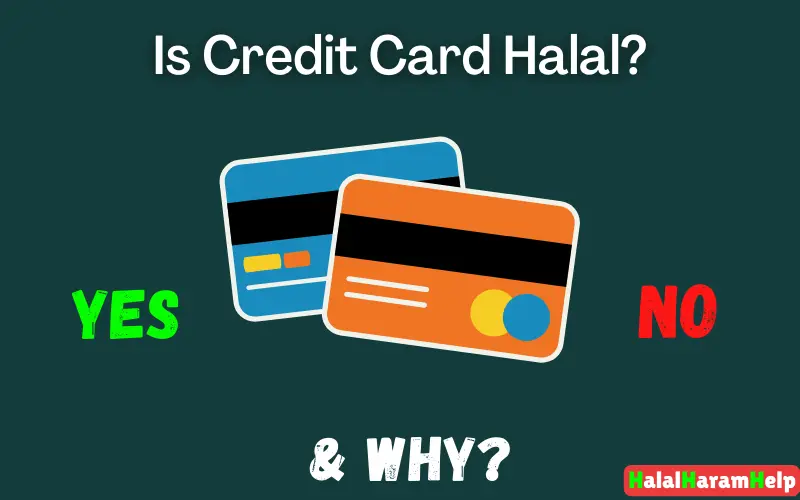In today’s fast-paced world, credit cards have become an essential financial tool for many individuals.
They offer convenience, security, and various benefits, such as rewards and cashback, which make them an attractive option for managing daily expenses.
However, for Muslims striving to live following Islamic principles, the use of credit cards raises important questions like is using a credit card halal (permissible) under Islamic law, or does it involve elements that are haram (forbidden)?
If you’re also searching the same, you’re in the right place. In this blog, we’ll clear all your doubts and clearly answer the query with proof. So let’s get in.

Is Credit Card Halal?
No, a traditional credit card is generally not considered halal. This is because most credit cards involve interest (riba), which is explicitly prohibited in Islam.
When you carry a balance on a credit card beyond the due date, interest is charged on the outstanding amount.
This interest constitutes riba, making the use of such credit cards impermissible in Islamic finance.
And even if you think you can pay the bills on time and avoid riba still it’s haram. This is because when applying for the credit card you’re signing the form in which you agree to pay the interest (riba) if you’re late.
So, at the stage of applying only, it becomes haram to have a credit card.
However, there are alternative options, such as Islamic credit cards, which are designed to comply with Sharia principles by avoiding interest and instead using a fee-based structure.
These alternatives can provide the benefits of credit cards while adhering to Islamic guidelines.
You can also learn is credit card halal.
Understand Credit Card & Riba
To understand why traditional credit cards are generally not considered halal, it is crucial to understand the concept of riba.
Riba, or usury, refers to any guaranteed interest on loaned money, which is strictly prohibited in Islam. The prohibition of riba is rooted in the Quran (Surah Al-Baqarah (2:275-279) and Hadith, as it is seen as exploitative and unjust.
Credit cards typically function by allowing users to borrow money from the issuing bank to make purchases.
If the balance is not paid in full by the due date, interest is charged on the remaining amount. This interest is a form of riba, making conventional credit cards non-compliant with Islamic principles.
Alternate Options To Credit Card
For those seeking to manage their finances in a manner consistent with Islamic principles, there are several alternatives to conventional credit cards that avoid the pitfalls of riba. Here are some viable options:
1. Debit Cards:
Debit cards offer a straightforward way to make purchases without incurring interest. Since the funds are directly withdrawn from your bank account, there is no borrowing involved, making this a halal option.
So instead of a credit card, use a debit card for any purchases or bill payment instead of a credit card.
2. PayPal:
In regions where debit cards are not accepted, PayPal can be a useful alternative. By linking your bank account or debit card to your PayPal account, you can make online transactions without involving credit.
On most platforms where debit card is not accepted there is a Paypal option with credit cards, so go with Paypal in such cases.
3. Cash:
Using cash is the best way to avoid any interest or hidden fees. While it may not be available in all online payments where it is available make sure to use this option only.
4. Islamic Bank Credit Cards:
Some Islamic banks offer Sharia-compliant credit cards that avoid interest by using a fee-based structure.
These cards are designed to provide the convenience of traditional credit cards while adhering to Islamic laws. So do check your nearby Islamic bank if you’re forced to use credit card only.
5. Prepaid Cards:
Prepaid cards function similarly to debit cards but require you to load money onto the card before use. This prevents overspending and ensures that you are using your own money, not borrowing.
These options provide various ways to handle financial transactions while maintaining adherence to Islamic principles. By exploring and utilizing these alternatives, you can navigate modern financial systems without compromising your faith.
FAQs
Q. Is there any Islamic credit card?
A. Yes, there are Islamic credit cards available in many regions, designed specifically to comply with Sharia principles.
Q. Is it haram to use credit card points?
A. Yes, using credit card points derived from a traditional credit card is generally considered haram in Islamic finance. Since conventional credit cards involve interest (riba), which is prohibited in Islam, any benefits or rewards derived from such transactions are also considered impermissible.
Q. Is credit card cashback halal?
A. No, credit card cashback is not halal because the card itself is not halal.
Conclusion
In conclusion, it is clear that using a conventional credit card is haram in Islam due to its involvement in riba.
The prohibition of interest aligns with the fundamental principles of justice and fairness in Islamic finance.
However, alternatives such as Islamic credit cards and debit cards offer viable options for managing finances while adhering to Sharia principles.
Muslims need to prioritize ethical considerations in their financial dealings, seeking halal alternatives to conventional credit cards to ensure compliance with their faith.


